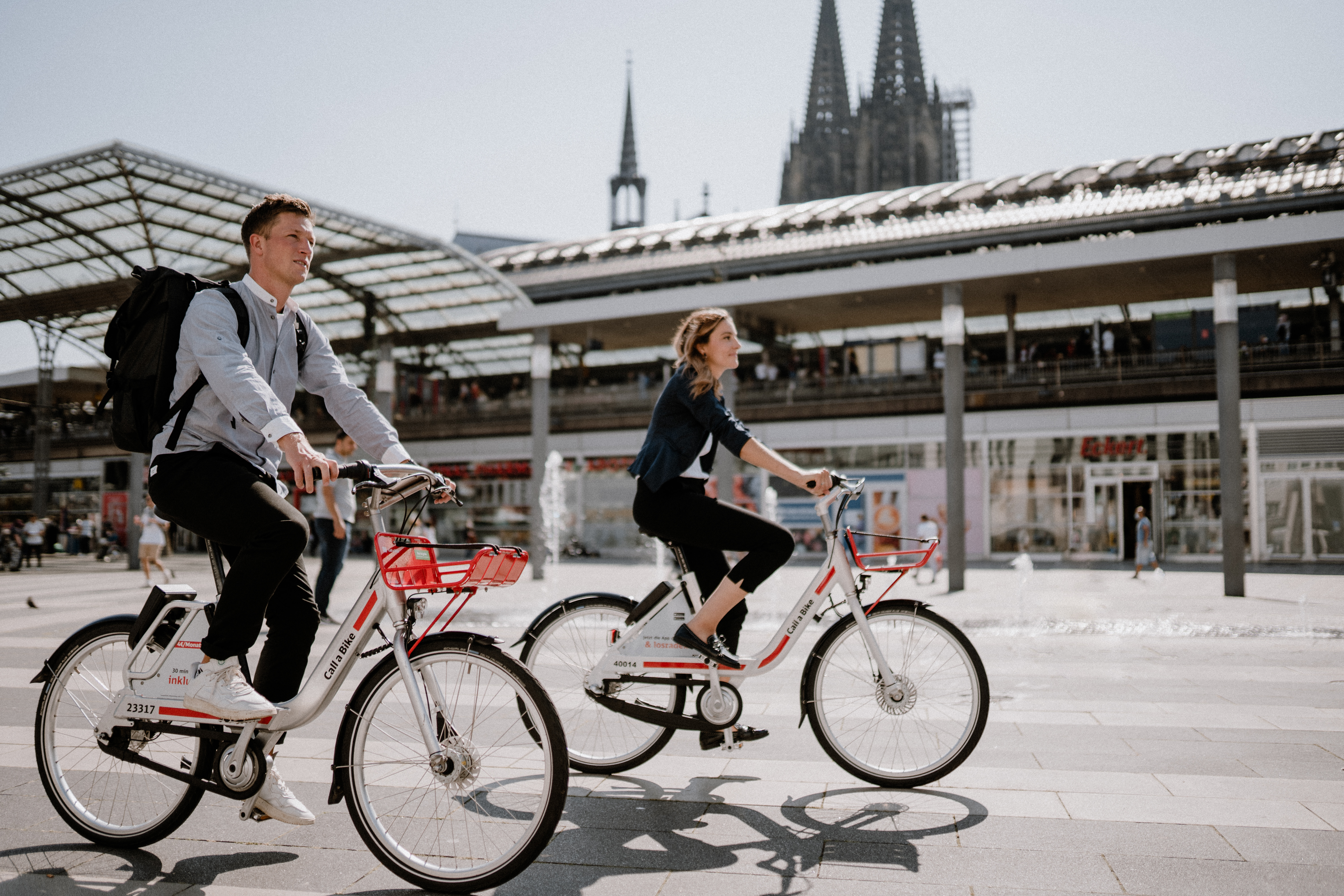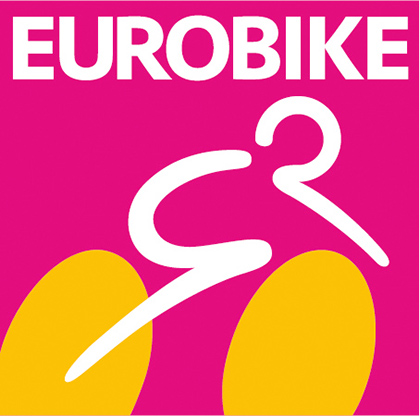
Hello Cornelius, Deutsche Bahn Connect is a mobility partner of Eurobike. Why is this cooperation with Eurobike important for you?
We at Deutsche Bahn regard the bicycle as an essential element in sustainable mobility as a way of bringing more people to and from rail connections. This is why it is important that visitors to the show should not only complete their outward journey by rail, but should also be able to enjoy a sustainable mobility solution for the last mile from rail station to the show – including a solution based on the bike.
What specifically can we expect in Frankfurt during the show? Will there be free rental bikes for everyone?
Every visitor to the fair will receive a Call a Bike voucher worth 10 euros for the week of the show. This will be issued with the Eurobike ticket. Visitors can enter the code in the Call a Bike app and will then be able to use their credit balance straight away. In order to simplify handling, the number of base stations in the city will be increased. The background behind this is that, in general, you can in fact leave a Call a Bike anywhere within the service area, but if you don’t leave it at a docking station, a one-euro “flexfee” will become payable. This is why we will be increasing the number of stations we offer around the show entrances and the Eurobike events. Our service team has the task of ensuring the bikes are available at the key pressure points. This means that there should be enough bikes at the station in the morning and around the show grounds during the afternoon.
To help understand this, can you please explain the difference between Call a Bike and DB Connect?
Deutsche Bahn Connect GmbH is a subsidiary of Deutsche Bahn AG and is responsible for the mobility management of the DB Group. It is in charge of fleet consultancy, fleet management, the chauffeur service and also for the procurement of service vehicles for DB AG as well as their resale via DB car showrooms. Through sharing services such as DB Firmenrad, DB Connect provides state-of-the-art and environmentally friendly solutions for DB employees.
On the external market, DB Connect operates Germany’s largest stationary car sharing network under the Flinkster brand, and is the pioneer of bike sharing in Germany with its Call a Bike service.
To supplement the sharing portfolio, DB Connect has also recently started offering digital mobility solutions such as the DB Bonvoyo mobility budget.
"The idea behind connected mobility is that customers should have a connection after their rail journey. A bicycle from Call a Bike is ready and waiting at the rail station and everything can be used via an app."
But how can connected mobility be made accessible? There’s a rather nice saying that states: the smartphone is becoming the new car key. Is that true?
If you ignore the digital aspect, connected mobility means that you have a connection after your rail journey. In other words, a bicycle from Call a Bike is ready and waiting at the rail station. You use it for the last mile and put it back on your return journey or leave it at your final destination. That’s the idea. Connected mobility means creating a connection with rail traffic. In the past you had to dial a number, hence the name Call a Bike, but now it all works via app and has become easier as a result. The next step is now integration into other apps so that you can use bike sharing in combination with other mobility services. In Stuttgart, for instance, we’re working with the app Polygo from Stuttgarter Strassenbahnen AG (SSB), who are responsible for public transport in the city. These multimodal apps show the various options and which means of transport are available to get you from A to B as fast as possible. Users can make their own decision on what they want to use. Another level of connection is when the various forms of mobility are all included into the fare structure. Polygo customers have 30 free minutes’ use of the RegioRad Stuttgart bikes. Furthermore, in Hamburg, for example, every StadtRAD-Hamburg customer has the first 30 minutes of every journey free of charge included with their annual fee of five euros. This makes mobility affordable. StadtRAD Hamburg is our most successful bike-sharing system. For long-distance journeys, there is the option of receiving 30 free minutes on every Call a Bike ride for customers in the BahnBonus Status scheme. Registration is necessary to take advantage of this scheme.
Although Call a Bike is celebrating its 20th anniversary this year, you can still barely say that bike sharing is established nationwide. What has to change in society before use of the systems takes over from actually owning a bike?
In large cities the rental bike has now become a familiar sight. Yet in the smaller municipalities there is still scope for a lot more development. And this can change in communication. We have to emphasise the opportunities offered by the use of bike sharing. Bike sharing provides a temporary alternative for certain journeys as a supplement to an existing bike. For instance, in cases where I don’t want to leave my own expensive bike at the station, or if I need a connection at my destination. The rental bike increases spontaneity because you can simply park it anywhere without giving any thought to the return journey. The other aspect is the price. StadtRAD Hamburg shows that with a reasonably priced service you can also persuade a lot of people to use bikes. Thanks to the offer of free minutes, it represents an interesting alternative for commuter traffic.
As a consequence, we are noticing a growing demand among customers in this field. Banks, for example, are offering their employees a flat rate for bike sharing with 60 minutes free for every ride. And Tesla is also working with us to offer its workforce in Brandenburg a rental system from the nearest station to its Gigafactory in Grünheide. As you see, when a company invests, things start to move in society as well.
"The important thing is that the political will must be present in the region and in the city."
Why doesn’t the scheme function nationwide in rural areas? Generally, there is no extensive public transport network in these regions, while, on the other hand, cycling there is more relaxed and pleasant than in the city.
Bike sharing cannot be run economically purely on the basis of revenues from rides. In rural areas, the lower population density and correspondingly less frequent usage means that revenues are lower than in urban areas. Consequently, a sharing scheme can only be operated if it is funded by the municipality. However, a successful bike sharing system also needs a good connection to the public transport network, which is frequently lacking in rural areas. Changes are also becoming apparent though. Around Stuttgart, we have managed to equip 50 municipalities with our system. We have created an extensive bike sharing network for commuters and day-trippers that is well frequented. Of course the proximity to Stuttgart plays an important role. One important aspect is that the political will must be present in the region and in the city. This is becoming increasingly common and politicians also want to see more people take up cycling.
One important point for the future is that of bicycle parking. The rail network has announced that it is going to create more spaces for parking bikes at rail stations. Is this is a benefit for bike sharing? Or will more rail users then travel with their own bikes?
Looking at mobility as a whole, we can say that parking spaces are tremendously important – particularly because bikes and e-bikes are becoming increasingly valuable and expensive. The ideal scenario would be for people to ride their own bikes to the rail station and find a secure storage space there. They would then take the train and use bike sharing for getting around at their destination. This promotes mobility overall and creates alternatives to travelling by car.

Service is an important aspect. The bikes also have to function properly. How is service managed?
In each of the large cities, we have our own workshop with bicycle mechanics who take care of service. Customers can report damage to the bikes and the team then takes care of the matter. In addition to this, we have service intervals for the bikes. The other option is for the service team to actively drive to the docking stations and check the bikes. This is organised individually with the municipalities according to the needs of the station.
Let’s take a look into the future: What role will bike sharing play in 20 years’ time?
The bicycle is enjoying a renaissance. We will have a better bike infrastructure and, as a result, more people on bikes. Even with autonomous driving, the car takes up a lot of space. This is why I envisage the bicycle being part of a healthy co-existence with the car. A higher proportion of e-bikes will see more people travelling from A to B faster. This is something cars in a city will not manage. Cycling is therefore here to stay – also because more sharing systems will be equipped with e-bikes.
About DB Call a Bike
With around 20 years of experience in bike sharing, DB Call a Bike offers a practical supplement to public transport and sustainable connecting mobility for travelers. The bikes stand for the highest quality and riding comfort. Conveniently and quickly rented via app, they are available in over 80 cities and municipalities. Call a Bike also includes the StadtRAD Hamburg, RegioRadStuttgart and StadtRAD Lüneburg systems, which are operated on behalf of municipalities.

